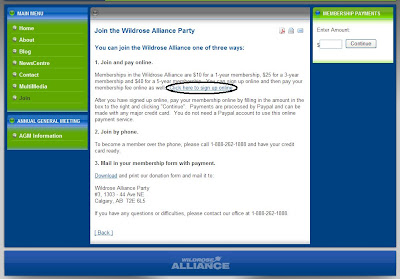It is an excellent example of why people should never think they can't make a difference; you can. You just need to step up to the plate.
February 9, 2009
To all Concerned Albertans,
I have made every effort to reach out to the Premier and the Energy Minister as well as my MLA and the PC Party and have come to the realization that the Premier is no friend of the oil and gas industry. Now many of you have already come to that conclusion but in my mind I wanted to do my homework and give him the benefit of the doubt and directly have him respond to the concerns that many of you have for the future of Alberta’s energy industry. It was unfathomable that the progressive conservative Premier would jeopardize the health of the energy industry. To me that would be irresponsible. Why would any Premier of Alberta put into question the viability of its major revenue stream?
Unfortunately I received a dose of politicking and re-learned a valuable lesson. Common sense has nothing to do with the PC party politics. My research has exposed what I believe is an anti-industry hidden agenda which began with the election of Mr. Stelmach as leader followed by the announcement of a royalty review, the appointment of the “Expert“ Royalty Review Panel and the presentation of their recommendations to the Premier. This was followed by the release of the NRF (New Royalty Framework) in October 2007 and implementation of the NRF in January 2009.
The recent announcement by Minister Knight of a new advisory panel comprised of Energy and Finance officials and CAPP and SEPAC is the result of the pressure that industry continues to put on the Premier and Minister as well as pressure from rural MLA’s whose towns and small cities and hamlets are feeling the brunt of the industry downturn. The Premier’s recent announcement of some form of relief for small and mid-cap oil and gas companies and tax incentives adds more confusion to the mix and short of the complete scrapping of the NRF, will have no effect short or long term on industry activity.
The unintended consequences have multiplied and the failure of the government to properly review, consult and forecast the effects of the NRF has come back to haunt them. Minister Knight told me that the royalty review panel experts would not be welcomed back to the new panel and that this government/industry review should have been done before the royalties were increased. This was recommended by many in the industry long before the royalty review panel was appointed. The government ignored these requests from industry.
The oil and gas industry was initially cautious and slow to respond publically to the announcement of the NRF, preferring to prepare submissions for the panel and appear before the panel and meet in private with the Energy Minister and Premier in an effort to convey the potential damage to the junior oil and gas sector and major oilsands projects. All this fell on deaf ears and the result is where we find ourselves today.
The industry was surprised and caught off guard by the magnitude of the royalty increases and the Premier dug in. And he remains dug in. He would not back down or back off. He was a man of his word and he promised the public their fair share. He embarked on a campaign that would discount and discredit the industry’s warnings and foretold consequences. “Big Oil” can afford it and that meant us all; start-ups, juniors mid-size and major oil and gas producers. Lost in all of this is the fact that the junior and mid-cap oil and gas sector accounts for +/- 70 % of the conventional oil and gas drilling activity in the Province.
These smaller companies are both public and private but rely solely on cash flow, occasional share issues and bank lines of credit to finance the exploration and development of their lands. These companies acquire leases and seismic, shoot seismic and interpret data, choose a location, acquire the surface rights of access, survey the wellsite and access road, license a well, drill it, complete it, tie it in and equip the well for production. The risk of success or failure is borne solely by the oil and gas companies and their shareholders; by and large Albertans but also includes investors from other provinces and countries.
Many senior energy executives have met privately with the Minister and Premier. The Premier and Energy Minister, while willing to listen, were unwilling to accept the representations of the industry and unwilling or unable to relate to our deep concerns for the health of the energy sector as a whole but more importantly the effects that all Albertans would realize if the NRF was not amended, cancelled or otherwise repealed, etc. It exposed the Premier as being an adversary to the industry as a whole. Everyone was “Big Oil” in his mind and he was going to call the shots. This despite what he says in public.
The special circumstances of the junior and mid-cap oil and gas companies and the role they play in the development of the remaining conventional oil and gas reserves in the Province was dismissed and ignored. The ever increasing costs of development in combination with diminishing production capability in a mature basin were dismissed. The material cost increases in regulatory compliance, delays in standard every day approvals, compliance with new regulations and environmental reviews and public consultations was also dismissed. No credit is given to companies for these sunk costs. They are the costs of doing business we were told. And the cost of doing business in Alberta had not so suddenly gone too far.
The removal of all drilling incentives including deep drilling incentives was dismissed as was the removal of the ARTC (Alberta Royalty Tax Credit) which allowed the deduction of Crown Royalties paid by the oil and gas companies from the corporation’s taxable income. This was implemented in the 70’s to counter a move by the federal government to eliminate tax deductions for royalties paid by oil and gas companies. The ARTC was used by small oil and gas companies as collateral for bank loans and accounted for 15-20% of their cash flow.
Every incentive to drill in Alberta has been taken away. And the assigned percentage of reserves that all oil companies held on Crown lands and that they held on their books prior to the NRF was drastically reduced when the NRF came into effect.
How does this affect the oil and gas companies?
Continue reading.
It is no secret that Blaine's letter has resulted in a boost to the Party, he said as much in his CBC interview a few weeks ago. It has prompted other Albertans to write similiar letters and to speak their mind. We must never be afraid of getting the facts out and helping other Albertans understand our current situation.










